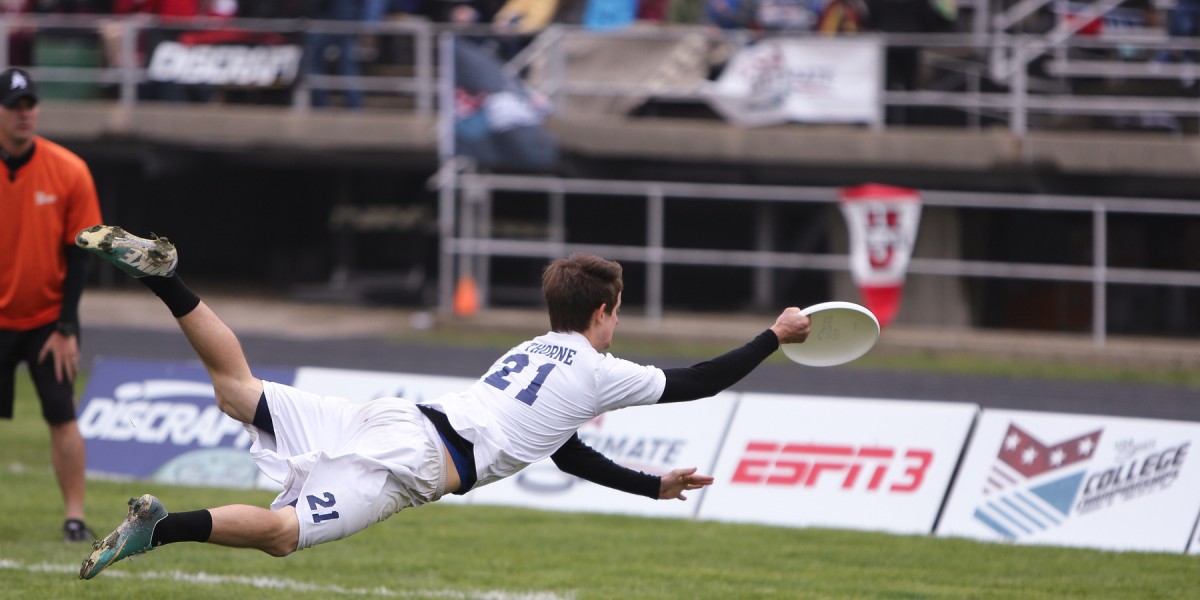 UltiPhotos.com" />
Alex Fraser - UltiPhotos.com
UltiPhotos.com" />
Alex Fraser - UltiPhotos.com
I had an interesting conversation a couple of weekends ago at Stanford Invite. The observers were going over the time limits and I really wanted to know exactly what the penalties were for going over time. Our usual sub-caller couldn’t make the trip and so I was stuck doing the job on top of a lot of other coaching responsibilities, so I knew that the chance of us going over time at least once was very, very good. (This turned out to be correct. We missed time twice, costing us disc at midfield on the second.)
Discussing the consequences sparked a philosophical conversation between myself and head observer Wes Chao. Time infraction penalties are set consequences for set behavior enforced by a third party. That’s reffing. Under Spirit of the Game, intentionally breaking the rules is verboten, but in a reffed system, breaking the rules is a matter of weighing the cost-benefit. Fouling at the end of a basketball game or the Seahawk’s endemic hand-checking are both great examples of the cost-benefit coming out on the side of breaking the rules. The observer system is a hybrid system that attempts a best-of-both-worlds combination: allowing players to call the things that they can do best (like fouls) and observers to call things that are difficult for players (like in-out and time). Time penalties (or penalties for language and encroachment) are refereed penalties. Here’s the question I posed to Wes: Does SotG apply in these circumstances? Are we still morally bound by SotG to not break the rules? Or does the refereed nature of these situations free us to take a more pragmatic approach?
~~~~~~~~~~
I’m not sure what rock you are living under if you’ve missed the contrived dust-up between MLU and USAU. (Back story here and here.) I’m not really interested in either the critique of USAU or details of the subsequent olive branch; you shouldn’t be either. The interesting stuff is all the currents swirling underneath the surface. Ask yourself: why would MLU do this?
- This was a single move. The critique and the olive branch are a part of an orchestrated strategy. (See #4 below.)
- This is coming from a position of weakness. If MLU has everything going its way there is absolutely no reason to make this move. However, it doesn’t have everything going its way. In addition to all the struggles you’d expect for a start-up in an emerging market, MLU lost the one competitive edge it had. That brings us to number 3…
- This is the AUDL’s fault. If it had accepted its little brother status and let MLU rule with big money, big talent and big cities, everything would be cool. Instead Beau went to the Spiders and Ghesquiere went to the Breeze. Then Sockeye bailed on the Rainmakers because it didn’t fit into their preparation for Worlds and the Triple Crown. And ESPN3? It is an impossible task to take on both USAU and the AUDL. The MLU lost ground this off season to both rival organizations.
- I am willing to acknowledge that this whole mess might not have been a coordinated strategy, but two separate events – the olive branch a reaction to the firestorm that followed the critique. For MLU’s sake, I hope not. It is far, far better to be Machiavellian than incompetent.
Amazingly, USAU responded. I don’t think they needed to — it would have been strategically fine to just let Snader rant on his own and pretend he doesn’t exist. But they chose to respond and in doing so made a very strong move. For most of Will Deaver’s reign in Boulder, USAU has been more concerned with management than leadership. (Management is focused on execution, logistics and process. Leadership is focused on vision. While management is quite possible without leadership, leadership is impossible without good management.) The focus within the organization has been on upscaling events and generating change through effective management and eschewing vocal leadership. (Deep breath, everyone. We all know USAU screws up, but before you go crazy, talk to someone who played in the 90s.) USAU has largely opted to avoid the tempestuous winds of rsd, Ultiworld and Twitter. Personally, I wish USAU had a bigger public presence, but there are some very valid strategic reasons to stay largely quiet. Because USAU is so often silent, it gives the rare occasions when they say something greater weight. With this piece, they’ve dictated the terms of the argument. The semi-pro leagues will have to address philosophical (SotG, gender representation) and practical (financial) issues before any meaningful discussion with USAU will happen.







Comments Policy: At Skyd, we value all legitimate contributions to the discussion of ultimate. However, please ensure your input is respectful. Hateful, slanderous, or disrespectful comments will be deleted. For grammatical, factual, and typographic errors, instead of leaving a comment, please e-mail our editors directly at editors [at] skydmagazine.com.